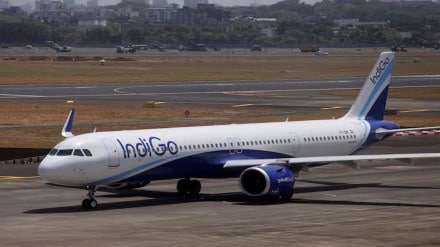IndiGo, is set to significantly expand its international footprint, aiming to increase the share of seats allocated for overseas flights to 40% by FY30, up from the current 28%. The move is part of a broader strategy to secure a larger share of India’s international aviation market, where it currently holds a 19% share.
IndiGo, which outlined its growth plans in a investor presentation filed with the stock exchanges on Wednesday, said that international expansion will be its key focus area. The no-frills airline, which has already doubled its international capacity share over the past seven years, expects to further boost its presence through fleet expansion, route additions, and the introduction of premium seating options.
The carrier’s ambitious roadmap includes increasing its aircraft fleet to over 600 by 2030 from the current 437. It anticipates receiving more than one new aircraft per week in FY26, supporting its goal of meeting growing demand in both domestic and international markets. IndiGo expects to carry 118 million passengers in FY25, with early double-digit growth projected for FY26.
Pieter Elbers, CEO of IndiGo, said that the international air travel from India has long been dominated by non-Indian airlines. “There is a great opportunity to address that market with our planes,” he said, signaling IndiGo’s intent to become a major player in the long-haul space.
The airline plans to introduce new routes across Asia and Europe, leveraging its upcoming Airbus A321XLR aircraft, expected to join the fleet this year. IndiGo recently took a major step toward long-haul expansion by leasing a Boeing 787-9 Dreamliner from Norse Atlantic Airways. Additionally, the carrier aims to introduce business class seats on select Airbus A321XLR and A350 aircraft to cater to the rising demand for premium travel. The decision follows IndiGo’s successful launch of business class seats on domestic routes last year.
IndiGo’s aggressive expansion comes as domestic airlines scramble to keep pace with surging air travel demand, despite ongoing aircraft supply constraints. The airline, which already commands nearly 60% of the domestic market, plans to add around 14 new destinations in FY26 to further strengthen its network.
As part of its broader growth strategy, IndiGo also plans to expand its workforce by over 3,000 employees, signaling confidence in the post-pandemic recovery of the aviation industry.
Domestic air travel market is poised for significant growth, with passenger numbers expected to double from 252 million to 510 million by 2030, according to IndiGo’s estimates.
On Wednesday, shares of Interglobe Aviation which runs IndiGo, closed up 3.54% at Rs 4978.15 on the BSE.
